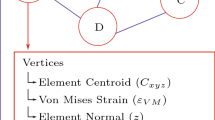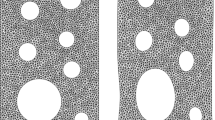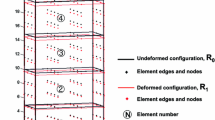Abstract
The Inverse Finite Element method (iFEM), employing a network of strain sensors installed on a structure reconstructs the displacement field independently of the structural loading conditions and material properties. However, the solution is compromised when the sensor network, due to logistic or cost constraints, is sparse and measureless finite elements are present. To overcome this issue the iFEM minimizes a weighted functional, assigning smaller weights to the elements missing experimental measures. Strain field pre-extrapolation techniques have been proposed to improve the iFEM performance, although still assigning arbitrarily small weights to the extrapolated strains. The current paper proposes a Gaussian Process as the pre-extrapolation technique for the strain field, which natively incorporates measurement uncertainty, therefore providing a metric to assign the functional weights, as well as confidence intervals for the displacement field computed through the iFEM. The proposed technique is validated with a virtual experiment; advantages and limitations of the proposed approach are also discussed.
Access this chapter
Tax calculation will be finalised at checkout
Purchases are for personal use only
Similar content being viewed by others
Notes
- 1.
It should be noted that since the solution is derived from a least square minimization of a weighted functional, the result does not depend on the absolute values of weights, rather on their ratio.
- 2.
In most shells, it is physically impossible to install strain sensors measuring the out-of-plane strain components g. Moreover, their contribution to the displacements in thin shells is at least one order of magnitude lower with respect to the contributions of the membrane and of the bending strains. Hence, in this article they are neglected and set to zero, without hindering the generality of the proposed method.
- 3.
The explicit form of the term \(\xi ^{i}\) has been omitted since it is a constant not multiplied by \({\mathbf {u}}^{i}\).
- 4.
A more rigorous approach for a proper hyperparameter inference would entail using a Markov-Chain Monte Carlo method to integrate out the hyperparameters from the posterior distribution. This approach has not been followed in this paper considering that in some applications the differences in the predictions are limited [3], but it is left for future research.
- 5.
It should be noted that only one sample from the sensors was needed to compute the uncertainty. Including more samples from the same sensors would shrink the CI.
References
Abdollahzadeh, M.A., Kefal, A., Yildiz, M.: A comparative and review study on shape and stress sensing of flat/curved shell geometries using c0-continuous family of iFEM elements. Sensors 20(14) (2020). https://doi.org/10.3390/s20143808, https://www.mdpi.com/1424-8220/20/14/3808
Betancourt, M.: Robust gaussian processes in Stan (2017). https://betanalpha.github.io/assets/case_studies/gp_part1/part1.html
Chen, Z., Wang, B.: How priors of initial hyperparameters affect gaussian process regression models. Neurocomputing 275, 1702–1710 (2017). https://doi.org/10.1016/j.neucom.2017.10.028
Colombo, L., Sbarufatti, C., Giglio, M.: Definition of a load adaptive baseline by inverse finite element method for structural damage identification. Mech. Syst. Signal Process. 120, 584–607 (2019). https://doi.org/10.1016/j.ymssp.2018.10.041. iD: 272413
Colombo, L., Sbarufatti, C., Giglio, M.: Anomaly identification in mechanical structures exploiting the inverse finite element method (ECCM -ECFD 2018 conference). In: R., O., de Borst R., J., R., C., P. (eds.) Proceedings of the 6th European Conference on Computational Mechanics: Solids, Structures and Coupled Problems, ECCM 2018 and 7th European Conference on Computational Fluid Dynamics, ECFD 2018, pp. 2234–2244 (2018). Affiliation: Politecnico di Milano, via La Masa 1, Milano, Italy, International Centre for Numerical Methods in Engineering, CIMNE (2020), cited By :3
Hendriks, J.N., Wensrich, C.M., Wills, A., Luzin, V., Gregg, A.W.T.: Robust inference of two-dimensional strain fields from diffraction-based measurements. Nuclear Instr. Methods Phys. Res. Sect. B: Beam Interact. Mater. Atoms 444, 80–90 (2019). https://doi.org/10.1016/j.nimb.2018.11.019. iD: 271559
Kefal, A., Oterkus, E., Tessler, A., Spangler, J.L.: A quadrilateral inverse-shell element with drilling degrees of freedom for shape sensing and structural health monitoring. Eng. Sci. Technol. Int. J. 19(3), 1299–1313 (2016). https://doi.org/10.1016/j.jestch.2016.03.006. Cited By :62
Kefal, A.: An efficient curved inverse-shell element for shape sensing and structural health monitoring of cylindrical marine structures. Ocean Eng. 188, 106262 (2019). https://doi.org/10.1016/j.oceaneng.2019.106262. iD: 271462
Kefal, A., Mayang, J.B., Oterkus, E., Yildiz, M.: Three dimensional shape and stress monitoring of bulk carriers based on ifem methodology. Ocean Eng. 147, 256–267 (2018). https://doi.org/10.1016/j.oceaneng.2017.10.040. iD: 271462
Kefal, A., Oterkus, E.: Displacement and stress monitoring of a Panamax containership using inverse finite element method. Ocean Eng. 119, 16–29 (2016). https://doi.org/10.1016/j.oceaneng.2016.04.025. iD: 271462
Kefal, A., Tabrizi, I.E., Yildiz, M., Tessler, A.: A smoothed iFEM approach for efficient shape-sensing applications: numerical and experimental validation on composite structures. Mech. Syst. Signal Process. 152, 107486 (2021). https://doi.org/10.1016/j.ymssp.2020.107486. iD: 272413
Lalchand, V., Rasmussen, C.E.: Approximate inference for fully Bayesian gaussian process regression (2020)
Micchelli, C.A., Xu, Y., Zhang, H.: Universal kernels. J. Mach. Learn. Res. 7, 2651–2667 (2006)
Oboe, D., Colombo, L., Sbarufatti, C., Giglio, M.: Comparison of strain pre-extrapolation techniques for shape and strain sensing by iFEM of a composite plate subjected to compression buckling. Compos. Struct. 262, 113587 (2021). https://doi.org/10.1016/j.compstruct.2021.113587. iD: 271517
Oboe, D., Colombo, L., Sbarufatti, C., Giglio, M.: Shape sensing of a complex aeronautical structure with inverse finite element method. Sensors 21, 1388 (2021). https://doi.org/10.3390/s21041388
Rasmussen, C.E., Williams, C.K.I.: Gaussian Processes for Machine Learning. University Press Group Limited (2006). https://books.google.it/books?id=vWtwQgAACAAJ. 2005053433
Stan: Gaussian Processes. Stan User’s Guide. https://mc-stan.org/docs/2_26/stan-users-guide/index.html
Stein, M.L.: Interpolation of Spatial Data: Some Theory for Kriging. Springer, New York (2012). https://books.google.it/books?id=aZXwBwAAQBAJ, 98044772
Tessler, A., Spangler, J.: A variational principle for reconstruction of elastic deformations in shear deformable plates and shells, 09 January 2003
Author information
Authors and Affiliations
Corresponding author
Editor information
Editors and Affiliations
Rights and permissions
Copyright information
© 2023 The Author(s), under exclusive license to Springer Nature Switzerland AG
About this paper
Cite this paper
Poloni, D., Oboe, D., Sbarufatti, C., Giglio, M. (2023). Gaussian Process Strain Pre-extrapolation and Uncertainty Estimation for Inverse Finite Elements. In: Rizzo, P., Milazzo, A. (eds) European Workshop on Structural Health Monitoring. EWSHM 2022. Lecture Notes in Civil Engineering, vol 254. Springer, Cham. https://doi.org/10.1007/978-3-031-07258-1_32
Download citation
DOI: https://doi.org/10.1007/978-3-031-07258-1_32
Published:
Publisher Name: Springer, Cham
Print ISBN: 978-3-031-07257-4
Online ISBN: 978-3-031-07258-1
eBook Packages: EngineeringEngineering (R0)




